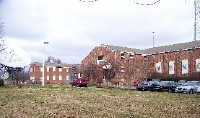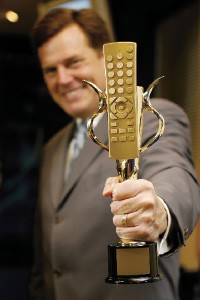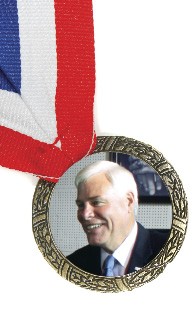The week before Christmas, Memphis’ public-broadcasting station WKNO-FM gave its listeners a surprising gift: an announcement that its news-oriented affiliates, WKNA-FM 88.9 in Senatobia, Mississippi, and WKNQ-FM 90.7 in Dyersburg, Tennessee, would be sold to Christian radio networks.
By April, or perhaps sooner, the Tupelo-based American Family Association (AFA) will assume the broadcast license of WKNA, and Rocklin, California-based Educational Media Foundation (EMF) will take over WKNQ’s, pending regulatory approval. (AFA declined to comment since the transfer is pending; EMF did not return calls for comment.)
Because of the timing, some listeners missed WKNO’s December 18th announcement of the agreement, valued at $2.8 million combined. Still, the news hit hard.
“Thanks for the early onset of holiday depression. WKNO’s sale of the Senatobia station to Christian radio is like a bad dream,” Joe Boone wrote in a letter to The Commercial Appeal in December. “I moved away from home but return frequently. Being greeted by the BBC was my favorite thing, outside of friends and family. Now it’s more true than ever: If 50 people moved away from Memphis, I would never see it again. You can have it. I want to love Memphis, but it won’t let me. Oh, well, go Tigers and thank God for satellite TV.”
Chris Rimel, co-publisher/editor of the Dyersburg State Gazette and a WKNO supporter, didn’t like the news either, considering there’s only so much tower space for radio stations to lease in that city, located about 90 miles north of Memphis on U.S. Highway 51.
Once WKNO gives up WKNQ’s transmitter lease, Rimel said, “they are basically leaving Dyersburg for good.” When that happens, WKNO can forget about mailing him a pledge card.
 Richard Thompson
Richard Thompson
Michael J. LaBonia believes the pending transfer of WKNA and WKNQ is a positive for WKNO. The sale will bring WKNO closer to its goal of building a new, $8 million facility debt-free.
The depth of the contributor unrest is unclear, since both stations are still on the air. WKNO, which is used to complaints, has braced itself nevertheless.
WKNO has ensured the survival of WKNA’s and WKNQ’s most popular programs, National Public Radio’s (NPR) Talk of the Nation and BBC World News. The former started simulcasting on WKNO-FM 91.1 on January 22nd; the latter show will be broadcast on WYPL-FM 89.3, the Memphis/Shelby County Public Library’s radio station, beginning February 5th.
Michael J. LaBonia is president and CEO of Mid-South Communications Foundation, the nonprofit that created WKNO-TV Channel 10 in 1956. WKNO-FM began in 1972. “We haven’t abandoned the goal of providing two full-power services to the market,” LaBonia says. “We’re just changing the approach to achieve that goal.”
WKNO provides programming 24 hours a day, seven days a week to 1.65 million people in its designated market area. WKNO still has WKNP-FM 90.1 in Jackson, Tennessee. LaBonia says the transfers are not the end but the start of a new — and inevitable — beginning.
The Approach
Going back to 1989, when it purchased the license of WNJC from then-Northwest Mississippi Junior College and created WKNA, WKNO sought to create a full-power, all-news format service for Senatobia. It later adopted that same plan for Dyersburg. What they’ve tried has failed, LaBonia says.
“In the last five years, we’ve done everything we thought we could do to make that [plan] possible,” says LaBonia, “but we get complaints.”
In some areas, their respective signals are spotty at best — and that’s after the power was boosted to 100,000 watts from 20,000 watts. “We are not able to get comparable service” in Senatobia and Dyersburg compared to WKNO-FM in Memphis, LaBonia says, adding that there is only so much that readjusting the direction of their antennae can achieve. “There are so many other noncommercial stations. You’re restricted by the amount of power and the direction of the antennae because you can’t interfere with the other stations.”
Even in Memphis, LaBonia experiences the same frustrations like any other listener. “I can’t get it at home. I get it in my car,” he says. But LaBonia is confident that will change with the new offerings. “We’re kind of enthused and excited about the transition taking place for us.”
The plan is for WKNO-FM stations to go high-definition, which will allow it to offer multiple, CD-quality radio streams on one frequency. It’s similar to what WKNO-TV Channel 10 does with WKNO-HD Channel 10.1, which began in 2004, and WKNO2 Channel 10.2, which launched last year.
“You will still be able to get 91.1, but you’ll also have 91.1 B,” says LaBonia, adding that WKNO might consider purchasing another FM station too.
WKNO already has a federal grant and its own matching funds to build an HD radio station. There’s a federal mandate for all radio stations to switch to HD by 2009, which would make WKNA and WKNQ expendable anyway since they have analog frequencies. LaBonia adds that neither WKNA nor WKNQ is profitable. Over the last 15 years, he says, WKNO has spent, on average, about $93,000 a year to subsidize their operations.
That’s tough for a community-operated nonprofit that receives the majority of its funding (83 percent between fiscal years 2001 to 2004) from membership activities and corporate and foundation support.
And that support fluctuates. From fiscal year 2004 to fiscal year 2006, Mid-South Public Communications Foundation experienced a 53.4 percent drop in direct public support as well as a 31.4 percent decrease in government contributions, according to its federal income tax statements.
While community support is influenced by the economy, public stations get grants from the Corporation for Public Broadcasting, which in turn receives its funding from Congress. In recent years, that source of funding has come under attack, so much so that public-broadcasting supporters fear that deep cuts in funding could ultimately affect the quality of and decisions related to local programming.
LaBonia says the challenge now is to find a balance in funding operations. Subsidizing competes with programming for crucial operating dollars.
 Richard Thompson
Richard Thompson
Dr. Karen Bowyer, president of Dyersburg State Community College, believes the loss of WKNQ will leave a void in Dyersburg, but it doesnt mean that shell cut her support for public broadcasting.
WKNO operates its TV and FM operations in what was once the entertainment building for the old Kennedy Hospital at Getwell and Park, which has been the South Campus for the University of Memphis since 1967. WKNO has been a tenant there since 1979.
While the university has grand plans for that campus (including a $44 million center for its audiology and nursing schools), WKNO wants to get out. Its building has no elevators, and the acoustics are a nightmare for production.
Toss in the fact that a prominent U of M booster has suggested locating a new multi-million-dollar football stadium on the South Campus, and LaBonia says, half-joking: “We have to get out of here, for sure, but we probably have some time before that happens.”
So, this is where the transfers come in: Ultimately, the sales of the two stations will net WKNO $1 million, giving it a total of $7 million in funds, close to its goal of $8 million for a new, 35,000-square-foot facility on five to eight acres. LaBonia wants the project to be debt-free.
“We’re not just building a building,” says LaBonia, adding that an Memphis Light, Gas & Water site off Interstate 40 is one of several possible locations. A land deal could be completed within the next two to three months. LaBonia estimates that it could take 18 months to construct the new facility.
The new building will allow WKNO to take advantage of emerging technologies and get ahead of the federal mandate for radio and television broadcasting to transition to high-definition formats by 2009. A number of Memphis media outlets have already made the switch.
In order to watch HD TV, you need a high-definition television. Same for HD radio. HD receivers can run from $77 to $1,500, according to Shopzilla.com.
Listeners
It’s still a mixed bag for listeners, at least for now.
Talk of the Nation simulcasts from 7 to 9 p.m. at the expense of some classical music programming on WKNO-FM. NPR’s Fresh Air With Terry Gross has been reduced to a half-hour during the week and now starts at 6:30 p.m. That was a slot once occupied by the 30-minute version of NPR’s All Things Considered, which is gone.
So is the classical music discussion program Exploring Music with Bill McGlaughlin from the 8 p.m. slot on WKNO-FM. Teri Sullivan, WKNO promotions manager, says: “It will go away for the time being.”
WYPL will carry BBC World News seven days a week from 6 to 8 a.m. and 11 a.m. to noon weekdays. Tommy Warren, broadcast manager for WYPL TV/FM, said the addition should strengthen the station’s morning programming. To make room, Warren said the station has reshuffled some of its pre-recorded programming.
 Richard Thompson
Richard Thompson
A land deal could be completed in a couple of months. Construction could begin by the middle of the year.
However, Senatobia and Dyersburg are too far away to receive strong and consistent signals from Memphis, according to a 2004 public coverage study conducted by the Public Telecommunications Facilities Program (PTFP), which is administered by the National Telecommunications and Information Administration.
Senatobia has alternatives: Rust College Public Radio, WURC-FM 88.1 in Holly Springs, and Mississippi Public Broadcasting WMAV-FM 90.3 in Oxford. Though WURC airs Talk of the Nation from 1 to 2 p.m. weekdays, it does not carry BBC World News, and its programming schedule is weighted toward jazz and gospel, not classical music.
On the other hand, WMAV has plenty of classical music but no BBC World News or Talk of the Nation. It does broadcast All Things Considered, according to its schedule.
WKNA would be the 20th station in American Family Radio’s (AFR) Mississippi portfolio, which includes adult contemporary and classic gospel formats. AFR, a division of the American Family Association and founded in 1991, has stations in 35 states.
In Dyersburg, public radio’s roots run deep.
An anonymous Dyersburg resident was one of two people who gave WKNO its name more than 50 years ago. KNO stands for “knowledge.” Now, it feels like WKNO is leaving for good, since its transmitter lease is part of the sale to EMF. Without WKNQ, according to the PTFP study, the seat of Dyer County will become a pseudo-void of public radio, existing on the fringes of the coverage areas for KASU-FM 91.9 in Jonesboro, Arkansas, and WKNP-FM in Jackson.
Life could revert back to pre-1993, the year WKNO created WKNQ. Before that, the city’s public-access TV channel broadcast the WKNO signal on its network. “It was a good strong signal too,” said Bill Hiles, a public-broadcasting supporter who retired this month after 23 years of reporting for the State Gazette.
And it’s not that people in Dyersburg are opposed to Christian radio. But there are already two EMF-owned “K-Love” stations: WUKV-FM 88.9 in Union City to the north and WKVZ-FM 94.9 in Ripley to the south.
The K-Love Radio Format began in Santa Rosa, California, in 1982. The network spans the country, from Alaska to Maine and from California to Florida, reaching more than 200,000 listeners online and 2.5 million via the radio each day, according to its Web site. The stations focus on providing news and information on Christian artists and events.
What’s the point of a third Christian radio station, asks Rimel. He’s not opposed to Christian radio, but he doesn’t believe that public broadcasting should sell stations for a profit. “Why did they expand to WKNQ in Dyersburg if they were not committed to the mission of public radio?”
Dr. Karen Bowyer, president of Dyersburg State Community College, was instrumental in bringing WKNQ to Dyersburg. She is also upset. She starts her day with NPR’s Morning Edition, loves the special programming that public radio offers, and depends on the international news to keep her abreast of what’s happening elsewhere.
Bowyer believes that international news gives people alternate perspectives to consider beyond their own. “We need another news option,” she says.
“For a democracy like the United States to flourish, we really have to have informed people at the grassroots,” Bowyer says. “We have to have everybody voting intelligently and having a lot of information. I think public radio provides a lot of that.”
Adds Hiles: “The strength of WKNO and NPR is their international coverage. ABC still does a credible job of international coverage, but CNN and MSNBC have three stories a day and they’ll repeat them over and over and over again. NPR does repeat, but I listen to NPR most days.
“You miss a guy talking about the difference between exploration and drilling in Anwar,” Hiles says. “You don’t typically hear that in your television broadcasts, and you certainly don’t hear it on your typical radio broadcasts. There are more people than you would believe who are interested in what they hear on NPR.”
Carol Feather, a music professor at Dyersburg State, says, “We get a lot of rather unbiased news from the BBC. I think you’ll find a much more balanced approach, a totally different approach from the U.S.”
John Gaudlin, retired president of First Tennessee Bank of Dyersburg, says he believes that the transfer will have a “big impact” on WKNO’s fund-raising efforts locally. “They’ll have a lot lower response from Dyersburg.”
Hiles is done. He’s retiring to Lexington, Kentucky, where he can listen to all the public radio he wants without a problem. If his WKNO pledge card came, Hiles says he would not renew. Neither will Rimel.
Bowyer says she believes that there will be “a definite void” and plans to talk to WKNO about what will happen next. And while she’ll miss the shows, public broadcasting is too important to her to cut her support of it.
Feather agrees, adding: “I’m not going to jump ship.”
Richard Thompson is a veteran business journalist who also publishes Mediaverse: Memphis, a Web site that covers Memphis media.
 Justin Fox Burks
Justin Fox Burks  Justin Fox Burks
Justin Fox Burks  Richard Thompson
Richard Thompson  Richard Thompson
Richard Thompson  Richard Thompson
Richard Thompson